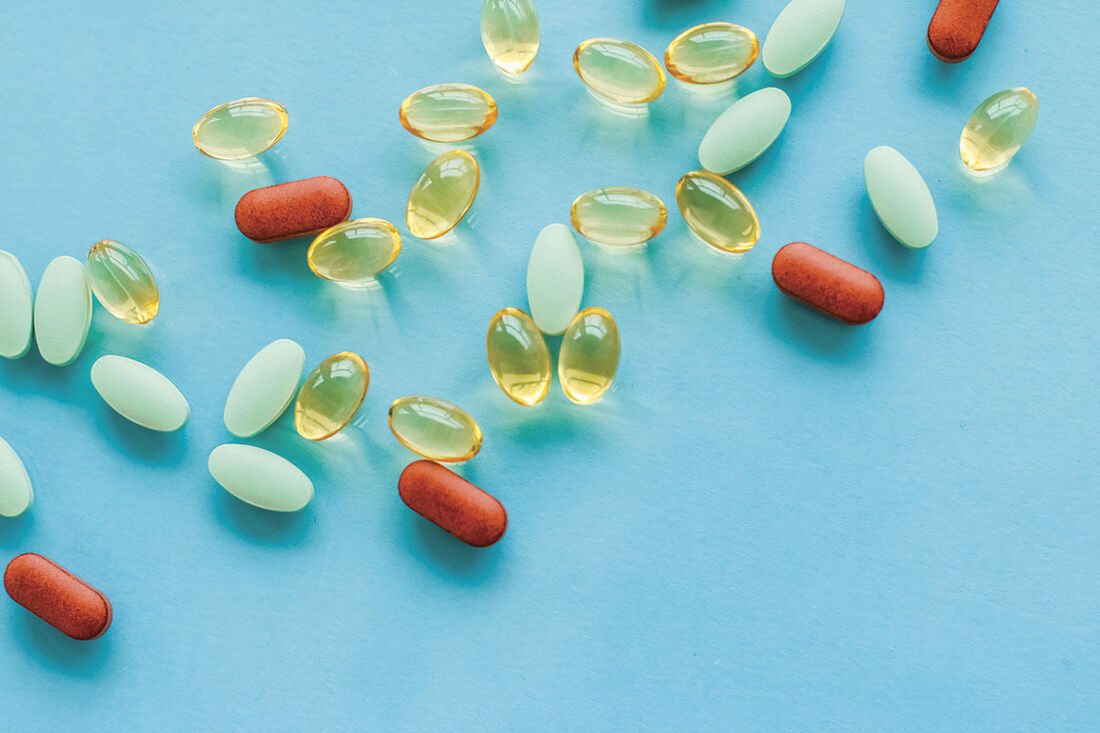 Photo by Cammeray Dave Photo by Cammeray Dave For a time in memoriam, people like Ponce de León braved the world’s oceans in search for the fountain of youth. They believed it was a body of water (river, spring, etc.) that had magical properties to slow the aging process and prevent sickness. As we’ve matured in our understanding of the human body and sailed far beyond wooden ships in our technological capacity, we now search the world online for those miraculous properties in a tablet, capsule, or powder. According to the latest market statistics, American consumers spent 61 percent more on beauty-related supplements in 2018 than they did the previous year—from $89 million to $144 million. This spike ranked the US first in growth in this category among seven nations with the highest anti-aging supplement sales for that year.1 While it’s easy to dismiss the notion of “anti-aging” products as snake oil and consumers as gullible, what does the research say? Top Anti-Aging Supplements We now know that aging has many causes. Primarily, it’s caused by damage to cells from highly reactive free-radicals that form inside the body from oxygen (i.e., oxidation). Another is through telomeres, which protect the ends of cellular chromosomes for healthy cell division. The shortening of telomeres over time has been linked to increased risk of disease and death.
Though aging is unavoidable, there’s evidence that a handful of dietary supplements may counter some of these age-related processes and diseases.2 Collagen is the main protein of connective tissue and the most abundant protein in the body, making up around a third of total body protein. Since much of it is found in skin, collagen is touted as a way of promoting a more youthful appearance. In a 2019 German study, 72 healthy adult women were randomized into two groups and given either the powdered collagen food supplement ELASTEN® or a placebo for 12 weeks. Each serving of the product contained 2.5 grams of collagen proteins plus other ingredients such as vitamin C, zinc, and biotin. After 12 weeks, the intervention group was assessed to have significantly improved skin hydration, elasticity, density, and smoothness versus placebo, which were sustained after one month with no further product use.3 In a second skin study from 2013, 114 adult women aged 45-65 were randomized to receive either 2.5 grams of the eye wrinkle formulation VERISOL® or a placebo. After 4 and 8 weeks, the treatment group (57 women) experienced a significant reduction in eye wrinkles versus placebo. Like the German study, positive effects endured for one month after the study.4 While many dermatologists espouse collagen supplementation, not all are on board with powdered or pill form. It should be noted that collagen is also used to reduce age and sports related joint and back pain, with some success in research. Curcumin is the primary chemical in turmeric spice and has potent antioxidant action. Research has shown this action to extend the lifespan of fruit flies and mice. In people, it’s been shown to counter cellular damage; delay age-related disease, including mental decline; and even mitigate age-related symptoms.5, 6 Curcumin helps slow what’s known as cellular senescence when cells stop dividing and can end up lingering—so-called “zombie” cells. It does this by triggering a metabolic protein signaling path, known as AMPK that cells rely on for energy needs. “Animal models have shown that compounds that activate the protein have health-promoting effects to reverse diabetes, improve cardiovascular health, treat mitochondrial disease—even extend life span,” say researchers at Salk Institute.7 The typical curcumin dose used in research is 500-2,000 mg daily in the form of a concentrated turmeric extract. Epigallocatechin gallate (EGCG) is the chief polyphenol in green tea. For decades, green tea has been studied for its strong antioxidant and anti-aging properties, as in Chinese smokers who drink green tea and have lower lung cancer rates than non-tea-drinking smokers. More recent research has demonstrated EGCG’s longevity-promoting and protective ability against death from all causes including, diabetes, heart disease, and multiple cancers.8, 9 Studies have also shown EGCG’s ability to protect against skin wrinkling from ultraviolet light.10 EGCG’s anti-aging effect may derive from its ability to restore cellular mitochondria and help prevent cellular senescence through activation of protein signaling pathways like AMPK and clearance of damaged cells (autophagy).10 Supplementation with EGCG green tea extract in place of, or in addition to, tea consumption may be practical since maximum benefits may only be obtained with 1 liter, or 3-5 cups, of daily green tea consumption. Elemental magnesium is a major mineral that is essential to the human diet and has an anti-aging ability. Research shows that as much as 75 percent of Americans fall short of the daily recommended intake of 320 mg for adult women aged 31 and older and 420 mg for adult men aged 31 and older. This inadequacy can increase the risk of age-related diseases such as type 2 diabetes. One 20 year study of 4,000 people, for example, revealed that those with the highest magnesium consumption had a 47 percent lower risk of diabetes.11 Another study showed supplementation of 450 mg of daily elemental magnesium substantially reduced high blood pressure in diabetic adults versus placebo.12 Magnesium’s overall anti-aging effect stems from its ability to lower systemic inflammation—the root of many chronic diseases. Quercetin belongs to the plant pigment family called flavonoids, having strong antioxidant properties. It is found in many plants and foods such as green tea, apples, berries, cherries, broccoli, and onions, which have the highest quercetin content. Quercetin’s potential aging-related benefits include, fighting free radicals (oxidation); antihistamine action for seasonal allergies; reducing inflammation, heart disease, and cancer risk; helping stave off neurological diseases like Alzheimer’s and Parkinson’s; and reducing high blood pressure.13 One study showed that rats given the equivalent of 80 mg/kg of quercetin daily experienced a stop to acute and chronic inflammation, along with anti-arthritis activity.14 A two month study of healthy male amateur athletes, given 500 mg of quercetin daily, showed a significant reduction in the inflammatory marker C-reactive protein (CRP). (In a different study, however, women with rheumatoid arthritis did not experience a reduction in CRP after two months of 500 mg of quercetin daily.)14 Other animal and lab research has shown quercetin’s ability to inhibit the processes involved in Alzheimer’s (for example, tau protein activation). Although developing a more stable form of quercetin that can pass through the blood-brain barrier in humans is needed.15 In general, most studies on quercetin have been in animals or a Petri dish, so more in human studies are needed for confirmation. The typical dose is 500-1,000 mg daily and often comes formulated with vitamin C and bromelain enzyme for better absorption. For additional reading, other supplements with evidence-based anti-aging properties are: coenzyme Q10 (ubiquinone); crocin (a flavonoid found in saffron spice); nicotinamide riboside (to help replenish NAD+ for proper cell function); theanine (an amino acid in green tea); garlic (potentially effective against skin aging); and resveratrol (a polyphenol/antioxidant made popular in red wine). LARGER PICTURE It is important to remember that many supplement studies are funded by the manufacturer, which can result in study bias. Any supplements should always be viewed as “supplementary” to a healthy diet (for example, Mediterranean style eating), along with regular physical activity and stress reduction. (It is generally advised that people first consult their healthcare provider before pursuing dietary supplements.) Experts acknowledge it is possible to slow biological aging on an individual level through a healthy lifestyle, though anti-aging science is still in its early stages. This past June, scientists at Washington State University discovered that where we live may impact how well we live and thus our ability to beat our genetic odds of reaching age 100. They noted that having resilient genes only accounts for about 20-35 percent of those odds.16, 17 While not involving a body of water with exciting magical properties, the researchers found that people living in mixed-age, higher-income communities, that are easily walkable, in either an urban or small town, may be more likely to see 100 years old. Through death records of nearly 145,000 Washington residents—aged 75 and older—between 2011 and 2015, it was determined that “survivability” was related to a person’s location. Poverty level, transportation, healthcare access, the number of working-aged adults nearby, whether it is a city or suburb, air pollution, amount of green space, and walkability, were determining variables for predicting longevity. Such data could eventually help build healthier neighborhoods that foster a longer life, the researchers said. Now the question is, how many centenarians live near you? 1. Menayang, A. (2018, September 26). The rise of beauty supplements in the US, in charts. Nutraingredients-USA. 2. Adapted from Kubala, J. (2020, April 6). The 12 Best Anti-Aging Supplements. Healthline. 3. Bolke, L.; Schlippe, G. & Voss, W. (2019, October). A Collagen Supplement Improves Skin Hydration, Elasticity, Roughness, and Density… Nutrients, 11(10), 2494. 4. Proksch, E.; Schunck, M.; Zague, V.; et al. (2014). Oral intake of specific bioactive collagen peptides reduces skin wrinkles and increases dermal matrix synthesis. Skin Pharmacology Physiology, 27(3), 113-19. 5. Sarker, M.R. & Franks, S.F. (2018, April). Efficacy of curcumin for age-associated cognitive decline: a narrative review of preclinical and clinical studies. GeroScience, 40(2), 73-95. 6. Bielak-Zmijewska, A.; Grabowska, W.; Ciolka, A.; et al. (2019, March). The Role of Curcumin in the Modulation of Aging. International Journal of Molecular Sciences, 20(5), 1239. 7. Salk Institute. (2019, January). “Health effects of metabolic ‘magic bullet’ protein: New model lets scientists activate health-promoting enzyme AMPK at any time and in any tissue” [News release]. ScienceDaily. 8. Zhao, L-G.; Li, H.-L.; Xiang, Y.-B. (2017). Green tea consumption and cause-specific mortality: Results from two prospective cohort studies in China. Journal of Epidemiology, 27(1), 38-41. 9. Eng, Q.I.; Thanikachalam, P.V.; Ramamurthy, S. (2018, January). Molecular understanding of Epigallocatechin gallate (EGCG) in cardiovascular and metabolic diseases. Journal of Ethnopharmacology. doi: 10.1016/j.jep.2017.08.035. 10 Prasanth, M.L.; Sivamaruthi, B.S.; Tencomnao, T. (2019, February). A Review of the Role of Green Tea (Camellia sinensis) in Antiphotoaging, Stress Resistance, Neuroprotection, and Autophagy. Nutrients, 11(2), 474. 11. Kim, D.J.; Xun, P.; Liu, K.; et al. (2010, December). Magnesium intake in relation to systemic inflammation, insulin resistance, and the incidence of diabetes. Diabetes Care, 33(12), 2604-10. 12. Guerrero-Romero, F. & Rodríguez-Morán, M. (2009, April). The effect of lowering blood pressure by magnesium supplementation in diabetic hypertensive adults with low serum magnesium levels… Journal of Human Hypertension, 23(4), 245-51. 13. Sissons, B. (2019, January 14). What are the benefits of quercetin? Medical News Today. 14. David, A.V.A.; Arulmoli, R.; Parasuraman, S. (2016, July-December). Overviews of Biological Importance of Quercetin: A Bioactive Flavonoid. Pharmacognosy Reviews, 10(20), 84-89. 15. Khan, H.; Ullah, H.; Aschner, M.; et al. (2020). Neuroprotective effects of quercetin in Alzheimer’s disease. Biomolecules, 10(59). 16. Bhardwaj, R.; Amiri, S.; Buchwald, D.; et al. (2020). Environmental Correlates of Reaching a Centenarian Age: Analysis of 144,665 Deaths in Washington State for 2011-2015. International Journal of Environmental Research and Public Health, 17(8), 2828. 17. Washington State University. (2020, June 17), Centenarian study suggests living environment may be key to longevity. ScienceDaily
0 Comments
Leave a Reply. |
Click the cover above to receive a free digital subscription
Archives
June 2022
Categories
|



